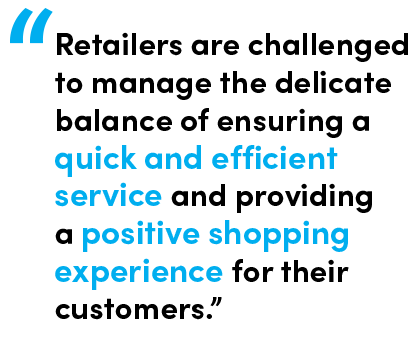Thought Leadership
Efficient Retail: The New ‘Must-Have’ Metrics for Specialty Retail
August 20, 2020 in COVID-19, Performance Management, Thought Leadership

Without a doubt, the current pandemic has changed the way consumers shop. As retailers adapt and create new opportunities within their business to drive sales, they also need to incorporate new metrics to accurately measure overall store performance. Relying solely on traditional types of retail math – i.e. Conversion rates, TY vs. LY – is no longer enough to provide insights on where to focus next. Instead, it has become increasingly important to analyze traffic efficiency as a measure of retail store performance. Understanding traffic efficiency will support retailers in their decisions on how to optimize labor spend, improve store operations, and drive revenue.
Traffic Efficiency Equals Efficient Retail
How has retail traffic changed since stores reopened? Interestingly, new traffic patterns have emerged and even flattened, spreading more evenly over the days of the week vs. historical trends. Consumers have increased shopping visits during weekdays now that many of them have the flexibility to work remotely. Further, reduced open hours and new in-store capacity restrictions have resulted in line-ups during busy periods. Consumers have instinctively begun to smooth out the daily and hourly traffic flow. Hitting your peak traffic numbers and relying on weekend traffic is no longer the norm. Instead, we see shoppers steadily engage with their preferred brands and with an intent to buy throughout the week.

Retailers must adapt and ask themselves, “are we being as efficient and effective as possible with the current shopper traffic we serve?”. Retailers are challenged to manage the delicate balance of ensuring a quick and efficient service and providing a positive shopping experience for their customers. Effective line management will be crucial while stores manage capacity limits. Retailers will need to identify new ways to engage and serve their customers while they are waiting in line. The ones that get this equation right will be significantly more successful as we move into this year’s holiday season.
Traffic efficiency can be accelerated by engaging with customers prior to them entering the store. By having store associates ask customers in advance to share their specific needs, or if they already know the products they intend to purchase, items can be ready at the Point-Of-Sale (POS) as soon as they enter the store. The customer enters the store, pays for their merchandise, and exits – allowing for a new customer to enter the store. This does not require fancy technology. Simply a pen and a piece of paper are needed to capture the customer’s needs. Truly, an effective way to engage with customers before they cross the lease line.
Key New Metrics for Specialty Retail: Visit Value and Capacity Turn
Pre COVID-19, retailers used to live and die by focusing on conversion rates. Yet today, they face new variables to manage in-store: customer limit and/or square footage capacity. The in-store customer experience has shifted from encouraging associates to prolong customer visits (dwell time) and build up the basket size to providing a safe, quick, and efficient experience – yet with the same brand spirit as before.
Traffic efficiency has a very significant role to play in understanding operational or staff challenges which may be impacting their stores. By measuring Traffic Efficiency retailers are ensuring they make the most of each and every visit within the least amount of time. Two key metrics which retailers need to include in their analytics: Visit Value and Capacity Turn are the key measures of traffic efficiency.
1. Visit Value: Getting the most out of each shopper’s visit
Getting the most out of each shopper’s visit. Visit Value analyzes the average sales value from each shopper that crosses a retailer’s lease line. It measures the balance between Quality and Quantity of Sales.
How to measure Visit Value? (Sales ÷ Traffic) or (Conversion x Average Transaction).
2. Capacity Turn: Turn shoppers around as efficiently as possible in-store
Capacity Turn analyzes how many times a store can serve the number of customers equal to its defined store capacity limits.
How to measure Capacity Turn? (Traffic ÷ Store Capacity).
In many ways, these new retail metrics have been borrowed from fast-casual dining. Think of it this way: Capacity Turn is similar to table turnover in a restaurant – how many times during the dinner rush can a restaurant get a new set of customers at each table; and Visit Value is about driving the value of each table up by offering drinks, sides, and desserts.
Ultimately, retailers must find the right balance between their brand’s promise (what they want to deliver) & efficiency. This is going to be critical for them to maximize their capacity limits and drive sales. They must adopt new ways of operating and service standards that encourage customers to make their purchases in-store as quickly as possible – and increasing their visit value – with the main goal of making room for the next shopper!
StoreForce can help you to achieve your retail goals and labor planning effectiveness. Interested in learning more? Contact us and engage with one of our retail experts as to how we can future proof your overall retail store management.
Author:

Allie Gratton is the Client Services Director at StoreForce. In her role, she interacts with client resources to provide guidance and input on how StoreForce can support their operational initiatives and build relationships with various levels of the client’s organization. She plays a direct role in opportunity identification, training, creation of program materials, and development of results reporting. Allie previously held various roles with a Canadian Specialty Retailer. Throughout these roles, she acquired significant experience and knowledge in managing sales teams and operating retail stores.

Recent Blog Posts

Insights from Industry Leaders at Retail Technology Show 2024
The Customer Experience Drives UK Retailers! There was a buzz in the air last week in London Retail Technology Show 2024 was crackin' with retailers looking for new solutions and...
READ MORE
The Top 7 Questions Asked at the Fabletics Road Show
The StoreForce Road Show was a fantastic event, bringing together retailers from all over Los Angeles County for breakfast and a lively discussion session with Fabletics’ Senior Director of Retail...
READ MORE
Future Stores 2024: Key Takeaways from StoreForce
Future Stores 2024 was an incredible event for brick-and-mortar retail, bringing together industry leaders to discuss and explore the latest trends and innovations As a participant, StoreForce...
READ MORESchedule a Consultation With Our Retail Experts Today
Contact us today for a 15-minute conversation on how StoreForce can help you drive store performance and execution for less than the cost of 1 transaction per week. Learn how retailers all over the world are driving performance and customer experience through our solution made exclusively for Specialty Retail.